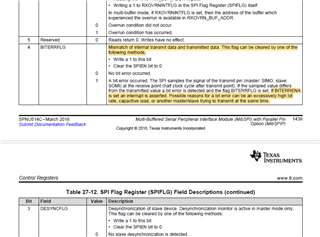Other Parts Discussed in Thread: ADS1256
Tool/software:
I am troubleshooting a problem we are having with SPI communication on the RM46L830PGET.
I notice that if I momentarily short the MOSI signal, the SPI port stops sending data. The SPI clock stops and no more data.
Our CS lines are manually controlled in software and they keep going as normal.
Juist wondering if there is some condition that can cause the SPI internal registers to get reset, but the rest of the processor keeps going.
I notice there is a parity error check, but we don't use that. Just looking for something that would stop the SPI clock only, since the software is not doing it.
Is there a known condition that can cause this?



